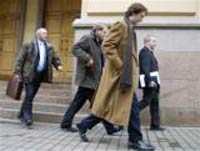British detectives investigating Russian's death return from Moscow
British detectives investigating the death of former Russian security agent Alexander Litvinenko returned to London on Wednesday after carrying out inquiries in Moscow, police said.

The team of nine officers said they had been offered "satisfactory" co-operation from Russian officials after arriving Dec. 4, said a Scotland Yard spokeswoman, on condition of anonymity, in line with policy.
Litvinenko died Nov. 23 from poisoning by the radioactive isotope polonium-210 and inquiries into his death are being carried out in Britain, Germany, Russia, France and the United States.
"All nine of the officers have now returned to London and are following several lines of inquiry," said the spokeswoman. "They had satisfactory cooperation from the Russian prosecutor general's office."
Scotland Yard detectives were not allowed to question witnesses themselves during their Moscow visit, but observed as Russian investigators conducted questioning.
Police officials confirmed that two Russian businessmen who met Litvinenko in a London hotel on Nov. 1 the day he fell ill had been questioned by the Russian and British investigators.
They are Dmitry Kovtun, who is undergoing treatment for radiation poisoning at a Moscow clinic, and Andrei Lugovoi, who formerly worked for a Kremlin bodyguard regiment under KGB command.
Moscow's Prosecutor General's office has opened a case of attempted murder in connection with Kovtun's poisoning. In Germany, authorities have found traces of polonium-210 in several locations in Hamburg visited by Kovtun just before he flew to London for the Nov. 1 meeting.
German prosecutors are investigating whether Kovtun may have illegally handled radioactive material. However, they have left open whether the radioactive trail meant he might have been involved in Litvinenko's poisoning.
Lugovoi, Kovtun and Vyacheslav Sokolenko, a third Russian businessman who was in London with them on the weekend of Nov. 1, have denied involvement in Litvinenko's death.
All three met Litvinenko at London's Millennium Hotel, where three people two employees and a Swedish visitor have tested positive for traces of polonium-210.
One member of staff at the Sheraton Hotel has also shown exposure to the element, Britain's Health Protection Agency said.
London police officials could not comment Wednesday on the nature of the interviews with Kovtun and Lugovoi, or comment on information collected during inquiries in Moscow, reports AP.
On Tuesday, the Kremlin brushed aside claims Scotland Yard investigators were unhappy about interference from Russians authorities.
"British investigators were provided all opportunities to meet and to interrogate those witnesses whom they wanted to interrogate connected with this," said Kremlin spokesman, Dmitry Peskov.
Subscribe to Pravda.Ru Telegram channel, Facebook, RSS!


